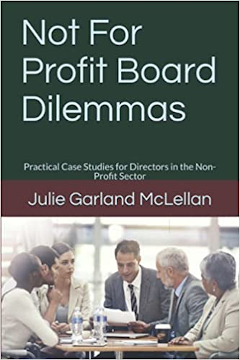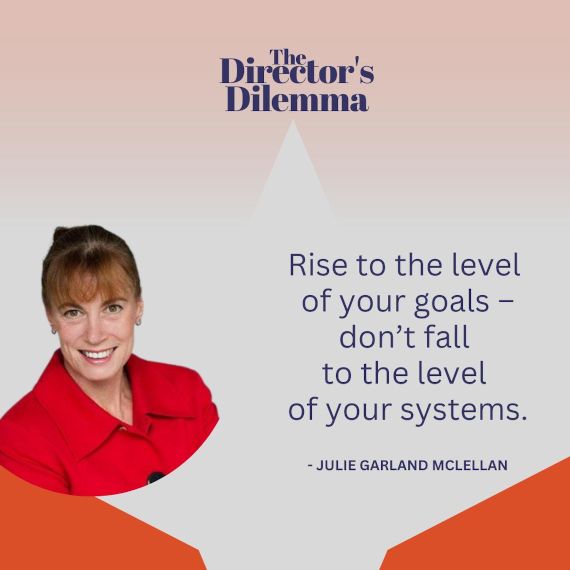|
|
|
|
|
|
|
|
|
Dear reader,
Welcome to The Director's Dilemma November 2022
Each month this newsletter looks at a real-life scenario that happened to a board, perhaps to a board like yours, and considers a range of responses. The scenarios are de-identified to protect the individuals concerned. This month we look at the options facing a board that will miss publicly stated targets.
The advice is general and designed to start your own thinking about how this could be approached in your personal context. If you would like specific advice, I work with boards and directors as a confidential mentor to help them build great companies and maximise their impact, and am an experienced board mentor.
To read this email in a web browser, go to www.mclellan.com.au/newsletter.html and click on 'read the latest issue'. I hope you will enjoy the latest dilemma:
 Xiomar chairs a medium-sized listed company. Two years ago, his board decided to develop an ESG strategy with some hard targets to drive performance. A committee was organized and recommended a 3-year target for reducing carbon emissions. This was approved by the board and released to the stock market as ESG commitments. Xiomar chairs a medium-sized listed company. Two years ago, his board decided to develop an ESG strategy with some hard targets to drive performance. A committee was organized and recommended a 3-year target for reducing carbon emissions. This was approved by the board and released to the stock market as ESG commitments.
After the first year of the strategy, the company realized the required process adjustments, new procedures and policies would greatly exceed the planned cost budget. To make things worse, the post-pandemic environment has reduced revenue and profits.
Xiomar's board sought a solution and considered buying carbon credits. This would be a cheaper and guaranteed way to reach the emissions reduction target, although the practice has fallen into some disrepute with recent claims that the credits are not a real reduction in emissions.
Xiomar has to take a fast decision. It is almost time to close the books and report. Either he can suggest that they report that they are behind schedule and considering abandoning the targets, or he can buy carbon credits and report that the target has been reached. Either alternative will be difficult for some of his directors and both will likely reduce shareholder confidence in the company's leadership team.
What should he do?
|
|
|
|
Carlos' Answer
 Xiomar must take a critical and sensitive decision many companies also deal with. As climate concerns become more relevant and ESG pressures force companies to commit for reducing externalities, can the planned outcome be converted into simple finance accounting? More than a mere embarrassment for companies, board directors may pay a high price in reputation if the business fails to report in line with upfront promises in that regard. Xiomar must take a critical and sensitive decision many companies also deal with. As climate concerns become more relevant and ESG pressures force companies to commit for reducing externalities, can the planned outcome be converted into simple finance accounting? More than a mere embarrassment for companies, board directors may pay a high price in reputation if the business fails to report in line with upfront promises in that regard.
Very true it's hard to become "green" when your numbers are "red", but environmental-related commitment must be a genuine proposition and not just a finance asset. The market will not easily accept replacing your own contribution for climate stability for such a simple alternative as signing a check and therefore, compensating another entity which has already covered its obligations. There is a legitimate argument for that: natural resources are just as finite as financial resources. The price to pay for abandoning your ESG commitment might be higher than the cost of doing it. The company will pay now or latter.
This decision should be taken sustained not only by finance advisors, but also by listening to ESG experts. Compensating carbon emissions usually implies significant technology substitution and production processes transformation, and so accepted as a mid to long-term journey. As it provides benefit for global climate and overall society, many cost-attractive international lines of fundings are available, which could help the company to keep aligned with its original focus. Or even not discarding buying carbon credits in some degree, but only as a short-term strategy and if it doesn't move the company out of its original tread to became sustainable, even at a slower pace.
Carlos H. Rocha is a business mentor and Associate Partner at CFO Hub. He has served as director for growing businesses and is based in Rio de Janiero, Brazil.
|
|
|
|
Julie's Answer
 The listing rules in most jurisdictions are very clear: if something is important enough to mention in prospect, it is important enough that it must be mentioned in retrospect. The listing rules in most jurisdictions are very clear: if something is important enough to mention in prospect, it is important enough that it must be mentioned in retrospect.
If Xiomar's board has announced the targets to the stock exchange they must announce, with equal prominence, that they will not meet them as originally envisaged.
That is the easy decision. Next Xiomar must lead his board in a discussion to decide if they will embark on a strategy of purchasing carbon credits. This should involve an up to date assessment of the likely costs and sources of credits and the veracity of claimed carbon absorption or reduction made by each potential seller of the credits. This is a difficult task, and they should engage specialist expert assistance.
Whichever way they decide to proceed, given the previous announcements, they should probably also announce their decision and its implementation.
The only way to gain and maintain trust is to be totally honest about what has happened, what impact that will have on their financial results and carbon emissions, and what they intend to do in the future.
Julie Garland McLellan is an experienced non-executive director and board advisor based in Sydney, Australia. She travels the world providing director education and board development.
|
|
|
|
Scott's Answer

If Misery Loves Company, Xiomar will not be alone. Many companies, Chairs and executive leadership teams are struggling to fulfil ESG commitments made at a different time and under different circumstances. A recent EY Report suggests that while businesses are improving on climate disclosure, they are lagging on decarbonization.
Companies are beginning to embrace more detailed reporting and measurement in their analyses of business risks and articulating various 'road maps' on their journey to net zero-carbon and long-term sustainability, but execution and implementation are proving difficult across many sectors. The long-term effects of the pandemic (supply chain disruption); Russia's invasion of Ukraine; and a series of extreme weather events have caused monumental disruption. Deeper causes may be at play that derive from the challenge to truly align purpose with authentic systems thinking.
In the recently published report by Cambridge Institute for Sustai nable Leadership, three topics emerge when engaging with leaders facing similar dilemmas to Xiomar's:
-
Embedding a corporate purpose aligned with sustainability.
-
Developing the necessary capabilities to deliver transformation.
-
Creating a dynamic and responsive relationship to impact data, performance thresholds and risk.
To address this dilemma:
-
Xiomar should buy the carbon credits and report that they have reached their targets.
-
Xiomar must also disclose that the 'road map' is being revaluated, acknowledge the challenges, but not with a view to abandon the company's long-term goals, rather to further embed their sustainability actions in their corporate purpose and adapt a more innovative, collaborative approach.
Scott Eversman is a Managing Director at Diversified Search Group, where he leads the firm's Energy practice and an Executive Board Member on the Transatlantic Council for Boy Scouts of America. He is based in Princeton, New Jersey, USA.
What's online - My recent post calling out the propensity of fund managers to take credit for strategies that boards have endorsed (and that management have carefully analysed and implemented) has overtaken my video on what to look for when hiring a new company secretary to become the most popular item I have ever posted.
Video library - You might like to visit and subscribe to my YouTube channel to see all the videos on practical boardroom issues. There are now over 60 short videos on a range of board topics. Let me know of any topics you would like to see addressed and I will see if I can make that into a video for you. There are also some full-length videos of courses and conference presentations plus my candid thoughts on boards in the news. Please subscribe as I'm trying to build the channel. I promise I won't send you spam from YouTube!
Be a contributor - if you would like to attempt a response to the dilemmas for publication you will be most welcome. Simply reply to this email and let me know. I am always on the look out for new talent from around the world so please reach out if that sounds like something you could do. I am also always grateful for the generous sharing of the current and past contributors. I couldn’t create such an engaging newsletter without their help.
Let me help you - I would be delighted to speak for or train your board, staff, audience and/or group. My work covers director and whole board development and mentoring, board reviews, recruitment, and training executives in writing board papers. If I can help, please contact me at julie@mclellan.com.au.
|
|
|
|
Book Review - Not For Profit Board Dilemmas by Julie Garland McLellan

Reviewed by David Maywald
This is where the rubber hits the road, with real life scenarios. It's an excellent exposition of the types of governance issues faced by non-profit board members.
The case studies and the suggested answers are short, mostly one to two pages in length. There are three answers for most of the dilemmas, one from Julie and two from other experts. The answers draw out different perspectives and nuances, and deliver significant insight.
Many of the issues overlapped and intersected with governance issues that I have personally encountered, making for a riveting read.
This material isn't best suited to beginners or first time board members. I'd see this book as intermediate, and complementary (to both structured director training as well as complementary with board experience).
There are some differences between locations (legal/regulatory/compliance requirements across UK, US, and Australia for example). But this book demonstrates the power of group decision making - several heads focused on the same problem are much better than one. And that is the essence of how boards add value.
I would certainly recommend this book for many NFP board members, especially with a little experience through to moderately experienced directors. It's probably not the best introduction to non-profit boards (especially for small NFPs), because there's a lot of foundational knowledge prior to these rich practical perspectives.
Available at Amazon.
Inspirational quote for November

After all the recent scandals with leaked data, cyber security breaches, and invasions of privacy, it is important to move from stating lofty goals to building sound systems. If your board needs help, then get it.
It is cheaper to fix your systems than to pay the fines, suffer the embarrassment, and then have to fix your systems fast because the regulator commands it.
Focus your director and board development
Boards often struggle to get cut through and drive company performance. They work hard, then they work harder, then call in a consultant who recommends some changes, then they work harder still.
If that sounds like your board, don't worry. It is likely that you have simply been focusing on the wrong stuff. I have made a diagnostic tool that might help you to prioritise the actions that will free your board from the drudgery and allow you to maximise your impact. You can take the diagnostic here:
https://directorsdilemma.scoreapp.com
Call me afterwards for a personalised action plan to revitalise and enhance the impact of your board work.
A note on names - A few readers have asked me where I find the names for the protagonists in each case study; I 'borrow' them from people I meet or things that I read. Xiomar as a boy's name is pronounced zhoh-MAR. It is of Spanish origin, and the meaning of Xiomar is "famous in battle".
This newsletter - If you have any ideas for improving the newsletter please let me know. If you are reading a forwarded copy, please visit my website and sign up for your own subscription.
Suggestions for dilemmas - Thank you to all the readers who have suggested dilemmas. They are greatly appreciated. I will answer them all eventually. I could not write this newsletter without your help and without the generous help of all the experts who respond each month to the case studies.
Let's connect - I use LinkedIn to share information about boards and directorship with my friends and acquaintances. If you use LinkedIn and we are not yet connected I will welcome a connection from you. You can find me at linkedin.com/in/juliegarlandmclellan.
As I farewell you until the next issue on 1 December, I wonder where this year gone? I hope you have achieved all you wanted to achieve by now; and if not, there is still another month and a bit left to get there.
I look forward to greeting you again for the last Dilemma of 2022.
Enjoy governing your companies!
Best regards,
Julie

Main photo by Paloma Clarice at Pexels.com
Quote picture by Keitchy Sanchez for Julie Garland McLellan
Disclaimer: The opinions expressed above are general in nature and are designed to help you to develop your judgement as a director. They are not a definitive legal ruling and do not constitute legal advice. Names and some circumstances in the case study have been changed to ensure anonymity. Contributors to this newsletter comment in the context of their own jurisdiction; readers should check their local laws and regulations as they may be very different.
Privacy: I am privileged to have your contact details and keep them as safely as possible. I will alert you if they are ever accessed by any unauthorised person (the technical staff at ayuda help with publishing and issuing the Director's Dilemma and have access so they can send the newsletters to you). I do not sell your details to anyone; they are kept only for the intended purpose - sending you this newsletter and helping to build the judgement of company directors by providing a safe way to consider potential responses to real life events.
|
|
|
|
|
|
|
 Xiomar chairs a medium-sized listed company. Two years ago, his board decided to develop an ESG strategy with some hard targets to drive performance. A committee was organized and recommended a 3-year target for reducing carbon emissions. This was approved by the board and released to the stock market as ESG commitments.
Xiomar chairs a medium-sized listed company. Two years ago, his board decided to develop an ESG strategy with some hard targets to drive performance. A committee was organized and recommended a 3-year target for reducing carbon emissions. This was approved by the board and released to the stock market as ESG commitments.
 Xiomar must take a critical and sensitive decision many companies also deal with. As climate concerns become more relevant and ESG pressures force companies to commit for reducing externalities, can the planned outcome be converted into simple finance accounting? More than a mere embarrassment for companies, board directors may pay a high price in reputation if the business fails to report in line with upfront promises in that regard.
Xiomar must take a critical and sensitive decision many companies also deal with. As climate concerns become more relevant and ESG pressures force companies to commit for reducing externalities, can the planned outcome be converted into simple finance accounting? More than a mere embarrassment for companies, board directors may pay a high price in reputation if the business fails to report in line with upfront promises in that regard. The listing rules in most jurisdictions are very clear: if something is important enough to mention in prospect, it is important enough that it must be mentioned in retrospect.
The listing rules in most jurisdictions are very clear: if something is important enough to mention in prospect, it is important enough that it must be mentioned in retrospect.


